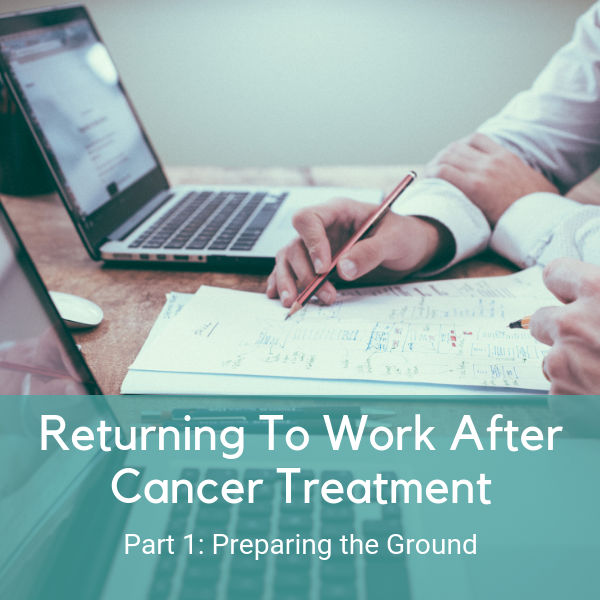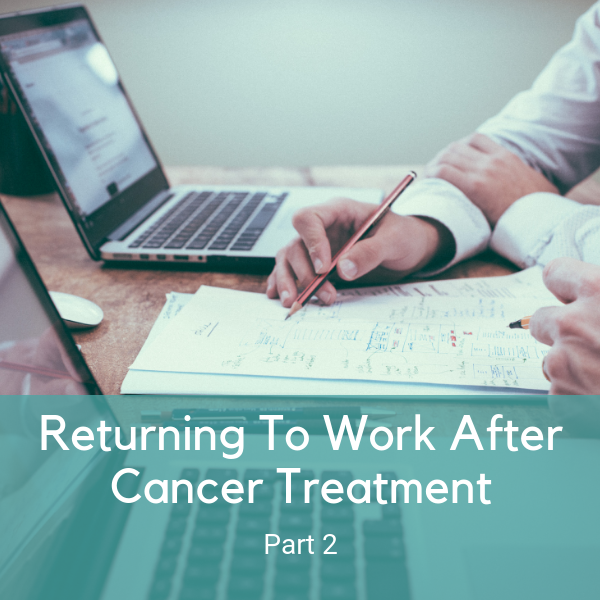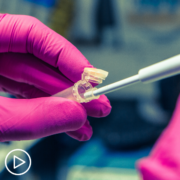Returning To Work After Cancer Treatment. Part 1: Preparing the Ground
This month’s article is the first in a three-part series which deals with common concerns on returning to work after a cancer diagnosis and offers practical solutions for helping with your re-entry into the workplace.
A diagnosis of cancer is a profound disruption in our lives, leaving no area untouched. Cancer impacts our family life, our relationships, and our careers. If you have been absent from work, the decision to return often brings with it mixed emotions. While you may welcome a return to normality, a steady income, the company of work colleagues and a sense of identity, you may also be feeling apprehensive about how you will cope.
Particularly if you are used to identifying closely with your job, a prolonged absence from work can be difficult. Even if you continue working during treatment, you may also experience some difficulties. You may be wondering how you will cope with your workload. Will your co-workers treat you differently? How will your boss react to you? Will your promotional opportunities be affected?
Although the majority of those who return (or continue) to work after cancer adapt well, some will encounter difficulties. In Part 1 of this series, we will take a look at some practical ways to prepare for your re-integration back into the workplace.
When Do You Know It Is Time To Return To Work?
There is no one-size fits all answer to the question of when it’s time to return to work. It will depend on the type of treatment you received, your financial situation, your physical and emotional state and other personal factors.
Only you know whether it would be better for your psychological health to be at home, away from any professional stresses, or at work, where distractions may take your mind off other things. Chris Lewis, founder of Chris’s Cancer Community, believes that “work can be a fantastic therapy, when dealing with life’s challenges. We feel valued, and of course, can provide an income for our family.”
On the other hand, perhaps you see cancer as an opportunity to re-evaluate your career. You may find that your work priorities have changed, or you feel unable to keep up with the demands of your previous work pace. Perhaps you want a new job which will allow you more flexibility to pursue other goals or you may want to explore working in a field which is more personally fulfilling (we will look at this in more detail in Part 3).
Preparing the Ground
Doing some groundwork before you return to work should help make re-entry more manageable. Plan in advance how you will respond to questions from co-workers, deal with your boss’s expectations, and handle your workload. Here are some tips to help you.
1. Making adjustments and accommodations to your work environment
Your employer has a duty to make ‘reasonable adjustments’ to your workplace and working practices. What is considered a ‘reasonable adjustment’ depends on factors such as the cost and practicality of making the adjustment, which is why it’s important to discuss things as soon as possible with your employer. Some things to discuss include the possibility (at least temporarily) of a phased or gradual return to work, job-sharing, working from home or flexi –time.
A word of caution here. It is not unusual for part-time work to turn into a full time job. Set clear boundaries about what is achievable in the hours you have agreed to work. If you are thinking about working from home, be aware that this can be quite isolating. Will you miss the camaraderie of the office?
Breast cancer blogger @lifeafterlola suggests that “A phased return is good, combining time back at work with work from home or a day off on, say, a Wednesday to break up the fatigue. The hardest thing to cope with,” she says, is getting back up to pace with early mornings, late finishes and travel on top of work and social adjustment.” Julia, co-founder of breast cancer Twitter chat, #BCCWW offers a practical tip to reduce the stress of traveling to work. “If it’s possible travel outside rush hour,” she advises.
Next, think about your physical environment at work. Revisit you work-station. Does it need to be redesigned or fitted with equipment such as back support or other devices to make you more comfortable?
The size of your company may affect how much accommodation to your needs you can expect to get. Larger organizations are in a better position to offer you more flexibility and support, but most employers will be understanding if you communicate your needs clearly with them. It may be helpful to have a letter from your doctor to document any accommodations required.
2. Getting up to speed with changes at work
Depending on how long you have been absent, you may find things have moved on since you were away from work. If this is the case, take some time to get up to speed with new systems and developments. This may include attending formal training sessions in advance of getting back to work, or having a colleague take some time to get you caught up again. Julia explains how she struggled initially with her job which “involved reading lots of draft legislation, policy papers, etc.” and after speaking to her boss, did some refresher training to get up to speed again.
3. Updating your co-workers on your plans to return to work
Most of us have built up a carefully constructed professional persona and we work hard at protecting it by keeping a fairly strict line of demarcation between our personal and professional lives. It can be unsettling to find these lines have become blurred by your illness.
Not everyone knows the right thing to say or how best to offer support. Connecting with colleagues before you return to work can, in the words of Julia, “get a little of the first day nerves out of the way, especially if you are feeling anxious about their reactions to your changed appearance.”
In general people will take their cue from you, so take the lead with colleagues. Talk them on the phone, send an email or arrange to meet for coffee or lunch. Reassure them that you are doing ok and that you still want to be a valued member of the team. Decide in advance how much you are comfortable sharing. If you are a naturally open person, then you can talk frankly with your work colleagues, letting them know what they can do to help you ease back into work. If you are more private, just tell everyone that you appreciate their asking, you are doing ok now and you are looking forward to getting back to normal.
4. Communicating with your manager
Most managers and bosses will support your transition back to work, but they may be unsure of how best to handle this. As Kate Bowles points out in this post: “The particular challenge of having oncology patients (which is what we still are) as staff under your management, as colleagues and as workplace friends, leaves everyone falling back on adhoc interpersonal skills.”
It can be difficult for managers and colleagues to know how to strike the right balance between giving you extra support and allowing you to carry on as normal. As Julia points out “Your line manager isn’t a mind reader. Be honest about what you can/can’t do, offer solutions, about managing work and don’t just leave it to them. It should be a two way process.”
For your part, you may have concerns about being perceived as a productive member of the team. Open and honest communication is key here. Check in regularly with updates on how you are coping and to review your productivity. If there are things that you are not ready to undertake initially, then be honest, and ask for help if you need it. Set clear boundaries that will allow you to say no to certain types of requests, such as staying late for non-essential projects. “Learn to say I can’t ….YET,” advises Siobhan Freeney, founder of Being Dense, an organization which raises awareness of Breast Density and its associated links to breast cancer and screening.
A note on work discrimination. Legally, your cancer history can’t be used against you in the workplace. But it can be difficult to determine this, because discrimination can be subtle. Know your rights. Look into whether you are protected by the federal Americans with Disabilities Act or your state’s Fair Employment Law.
5. Book a counseling session
If you are worried about how you will cope on your return to work, consider booking some sessions with a counsellor or cognitive behavioral therapist to build up your confidence and coping skills. Some employers have an employee assistance program in place which allows you to speak in confidence to a trained professional about your concerns. Ask if this is available in your company.
Learning some stress management techniques in advance of your return will also help you cope better (we’ll look at this in more detail in Part 2).
6. Stock your freezer
When we’re tired, we tend to gravitate towards processed food which depletes our energy reserves further. Siobhan suggests you “stock up handy home cooked freezer meals in advance of returning to work to avoid being tempted to skip dinner when over-tired.”
The key to managing the stress of working after a cancer diagnosis is to prepare as much in advance of your return to the work place. Be prepared to be flexible in your planning approach. Cancer recovery is an ongoing process. There will be many ups and downs. You may have to deal with late side-effects of treatment or side-effects related to medication. Be ready to adjust your work practices if and when you need to.
Next month, I will share more tips and practical advice on handling your work load, managing your time and dealing with issues such as fatigue and concentration once you return to work. Until then, if you have any tips to share with readers about how you prepared your own return to work, please share them in the comments below.

A Stanford Medicine X e-Patient scholar, Marie Ennis O’Connor is an internationally recognized keynote speaker, writer, and consultant on global trends in patient engagement, digital health and participatory medicine. Marie’s work is informed by her passion for embedding the patient voice at the heart of healthcare values. She writes about the experience of transitioning from breast cancer patient to advocate on her award-winning blog Journeying Beyond Breast Cancer.










